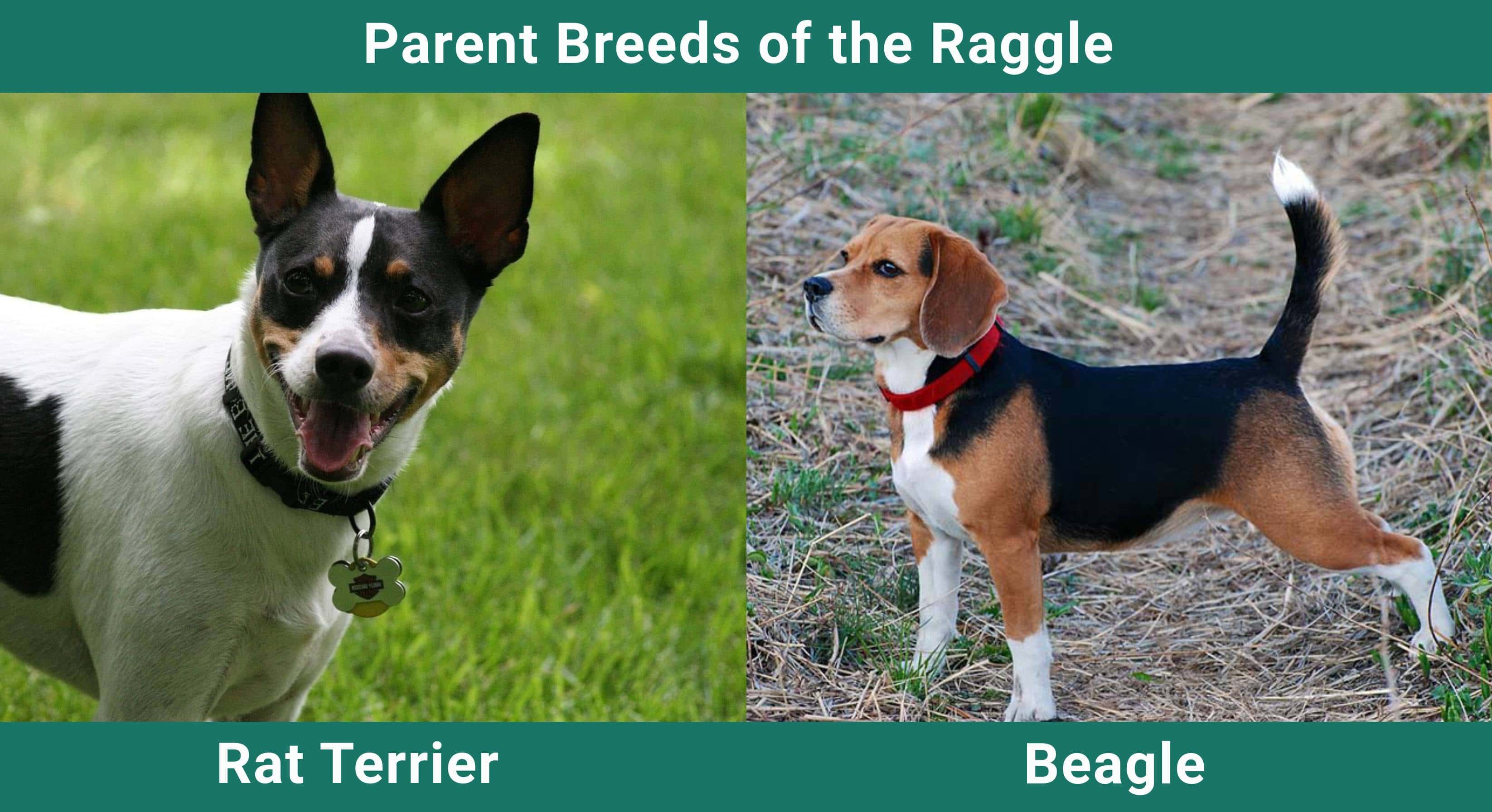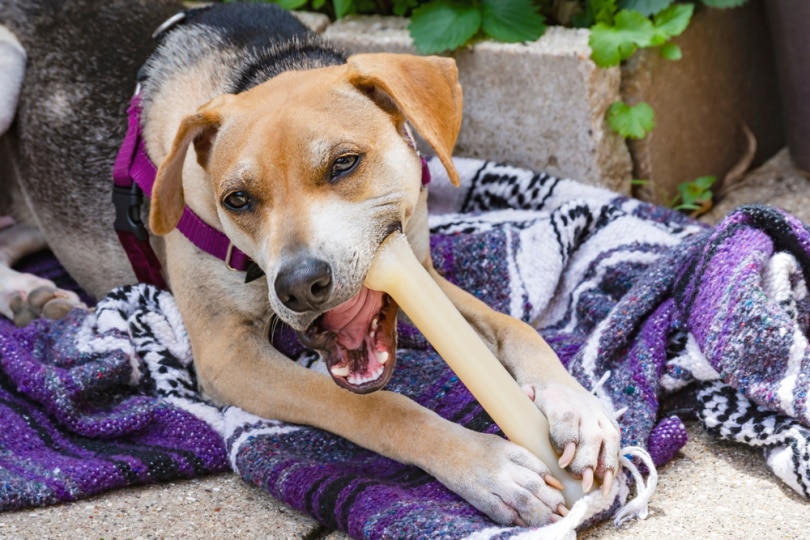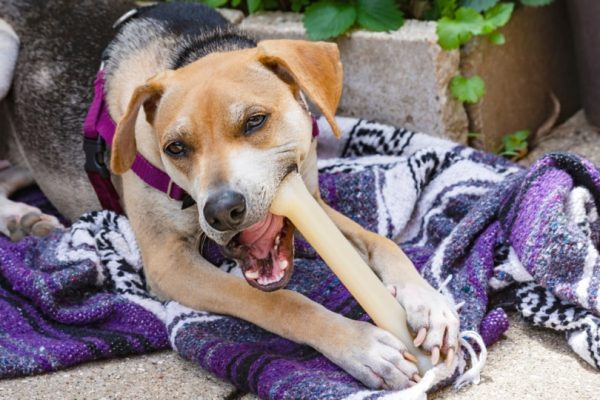Click Below to Skip Ahead
Most people are familiar with the charming Beagle, but few know the offspring of this breed mixed with the Rat Terrier. Ladies and gentlemen, meet the energetic Raggle! This jovial and alert little dog will seduce you with his boundless energy and endearing personality.
Breed Overview
Height:
8 – 12 inches
Weight:
5 – 20 pounds
Lifespan:
12 – 15 years
Colors:
Brown, white, black, cream, and lemon
Suitable for:
Active families, confident and experienced dog owners
Temperament:
Energetic, smart, willful, affectionate, alert
However, this designer dog has retained his parents’ strong hunting instincts, which doesn’t make it a much-loved companion for your other small pets! The Raggle also needs firm and consistent training; otherwise, you may end up with a little bully in the house. Discover all the other traits of this cross, as well as the care he requires to be happy and healthy.
Raggle Puppies
Depending on your location and the breeder, you may be able to find a Raggle dog easily. However, do not make the mistake of buying a Raggle pup from a breeder without having first visited his kennel and obtained all the necessary information on the parents! A responsible breeder will have no problem answering your questions, showing you the parents’ pedigree, and will have the puppy’s vaccination record up to date. Remember to ask the necessary questions to your breeder so you know all of the right information about your puppy.
Given that the Raggle is a mixed-breed dog, these dogs will display a wider variety of traits in their health, shedding, coloring, temperament, and behaviors. Each puppy will be a combination of characteristics found in the parent breeds.

Temperament & Intelligence of the Raggle 🧠
Since his parents, the Beagle and Rat Terrier, are of average intelligence, you probably won’t get a puppy with an IQ equal to that of the Border Collie, but neither will you have a dummy. However, the Raggle stands out for its high energy, which will be a major drawback if you don’t have an active lifestyle. But, adopting such a dog could be a great incentive to do more exercise, which will be beneficial for both!
In addition, the Raggle loves to explore his environment and will not hesitate to dig holes in your yard to escape because his curiosity is insatiable! Do not take it personally, though; this little dog is very attached to his family. It’s only that he needs a good dose of daily physical and mental stimulation, otherwise, he can develop destructive behaviors.
Are These Dogs Good for Families? 🏡
In short, yes! A well-socialized Raggle will be affectionate and gentle with the children in the family. However, your puppy is not the only one who needs to be educated; toddlers must also learn not to pull the dog’s ears and respect the times when he wants to be quiet. This is the best way to prevent the dog from losing patience and accidentally snapping at a child’s fingers (which can happen in all breeds, by the way).
Moreover, the Raggle will also like to snuggle up to his owner, but only after a period of play or another vigorous exercise.
Does This Breed Get Along with Other Pets? 🐶 😽
You guessed it, with such a parental lineage, there is little chance that your Raggle will become your cat or rabbit’s best friend! Of course, there are exceptions to every rule, but the lure of the hunt is so ingrained in the Raggle’s mind that it will be challenging to get him to cohabit with other small pets. Regarding other dogs, the Raggle can be dominant, even aggressive, especially if he has not been sufficiently socialized at a young age. However, with patience and good training, it is possible to make your Raggle more social and friendly to other dogs.
Things to Know When Owning a Raggle:
Food & Diet Requirements 🦴
The Raggle can be a fussy eater and gain weight easily. Besides that, it is a dog that needs a diet adapted to his small size without neglecting his high energy needs. Don’t overdo the treats to keep your pooch at a healthy weight; indeed, being overweight is particularly harmful in this dog, given his genetic predisposition to have hip dysplasia.
Exercise 🐕
There’s no getting around this: the Raggle will need a lot of exercises to burn off excess energy, so be prepared to run, walk, jog and play with your pup a lot! We recommend at least 60 minutes a day. In addition, obedience sessions and dog park trips will help keep your Raggle in good physical and mental health.
Training 🦮
This is where an experienced dog owner comes in handy: although intelligent and eager to please his owner, the Raggle is easily distracted by all the smells and objects around him. Training can therefore be tricky and time-consuming. You will need to use the techniques of positive reinforcement, rewards, treats, praise, love, and a lot of patience. However, by dint of consistency, you will end up with a balanced dog who is delighted to please you. However, his stubborn little side will never be far away!
Grooming ✂️
Another advantage of the Raggle is that he does not require a weekly subscription to the local groomer! This hybrid dog is indeed considered low maintenance because he loses very little hair. A good weekly brushing will be more than enough to get rid of dead hair and maintain his shiny coat. Add an occasional bath, regular tooth brushing, and weekly nail trimming to this beauty routine, and you will have a stylish and healthy dog!
Health and Conditions ❤️
The Raggle has a life expectancy of between 12 and 15 years, which is average for dogs. However, he can be predisposed to the same health problems as his parents, which is why it is essential to check with the breeder if the following tests have been done: hip, thyroid, and eye tests. This will make it easier to follow up with your veterinarian and manage certain major health conditions on time.
- Glaucoma
- Elbow Dysplasia
- Hip Dysplasia
- Hypothyroidism
- Patellar Luxation
- Legg-Calve-Perthes Disease
- Epilepsy
- Primary Carnitine Deficiency (CUD)
- Intervertebral Disc Disease
- Congenital Heart Defect
Male vs Female
There is no noticeable difference between the male and female Raggle, other than the possibility that the male is slightly larger and heavier. Ultimately, your puppy’s personality will be determined by the dominant traits of his parents, as well as the training he receives and the environment in which he evolves.
3 Little-Known Facts About the Raggle
1. His Ancestor Was a Pocket Beagle
It just doesn’t get any cuter than this: the first Beagles were known under the name of “Pocket Beagles” because they were so tiny that they fit in the pocket of the hunter! They were then bred to be bigger; the modern Beagle would descend from the Talbot Hound, North Country Beagle, and Southern Hound. Farmers in England, Ireland, and Wales used them for hunting rabbits.
2. No Rat Can Resist the Rat Terrier
In the years 1910-1920, the majority of American farmers owned at least one Rat Terrier to rid infested fields of rodents, whether in the middle of crops or underground and to keep the farm rodent-free. Around this time, in the Midwest, the Rat Terrier was crossed with the Whippet and Italian Greyhounds to obtain more versatile and faster dogs, better able to hunt hares in the fields. At the same time, in the Center and the South, he was crossed with the Beagle to increase his flair, hunting skills, and pack instinct.
3. He Makes an Excellent Watchdog
The Raggle may be small, but he is vigilant, which makes him a good guardian. Plus, if you’re into hunting, he will make a great companion, warning you with a short bark of prey proximity. However, his yapping can become a nuisance in the home, especially if you live in an apartment.
Final Thoughts
The Raggle is not a dog for everyone, but it will suit the experienced, active owner who wants to add a companion to his hunting trips. This crossbreed can also adapt to apartment life, but this is not ideal given its high energy requirements. So, if you live in a house with a fenced yard, have dog-friendly children, and don’t own other small pets, the Raggle might be a perfect dog for you!
We have more Beagle Mixes and Rat Terrier Mixes for you to explore!
Featured Image Credit: Jennifer Tepp, Shutterstock










